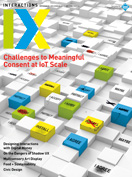Authors:
Uri Kartoun
A significant portion of my time as a research fellow at Massachusetts General Hospital (MGH) was dedicated to the exploration of a cohort of 314,292 patients at increased risk for metabolic syndrome [1]. Patients in this cohort had at least one type 2 diabetes mellitus (T2DM) diagnosis code, a T2DM medication, an HGB A1C level ≥ 6.5 percent, or plasma glucose ≥ 200 mg/dl. Of these patients, 65,099 were diagnosed with T2DM at a specificity of 97 percent and positive predictive value of 96 percent [2]. During my training years (2013–2016), my colleagues at MGH and Harvard and I…
You must be a member of SIGCHI, a subscriber to ACM's Digital Library, or an interactions subscriber to read the full text of this article.
GET ACCESS
Join ACM SIGCHIIn addition to all of the professional benefits of being a SIGCHI member, members get full access to interactions online content and receive the print version of the magazine bimonthly.
Subscribe to the ACM Digital Library
Get access to all interactions content online and the entire archive of ACM publications dating back to 1954. (Please check with your institution to see if it already has a subscription.)
Subscribe to interactions
Get full access to interactions online content and receive the print version of the magazine bimonthly.






